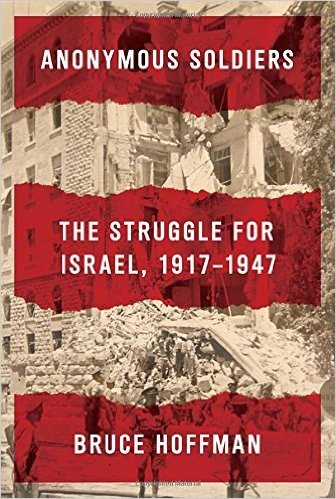
“Terrorism can, in the right conditions and with the appropriate strategy and tactics, succeed in attaining at least some of its practitioners fundamental aims,” the author concludes.

It does not so much focus on the struggle between the groups as on the conflict between the British and the Jewish Lehi and Irgun organizations. In Anonymous Soldiers, he uses Jewish groups that employed what would widely be described as terrorism - bombings, bank robberies, assassinations and shootings - against the British and Arabs in the 1930s and 1940s as his lens for the history of this period and region.Īlthough this well researched book based on primary sources claims to cover the period 1920 to 1948, its real focus is the last decade before Israel’s independence. Professor Bruce Hoffman, an expert on terrorism and insurgency and director of the Center for Security Studies at Georgetown University, seeks to examine the Jewish violence in Palestine as a case study in examining whether terrorism is effective. The time had come to end “passive defense,” demanded their leader David Raziel now was the time to take the fight to the British rulers and Arab majority of Palestine and drive them out so a Jewish state could be formed.

After a thorough examination of the event, he concludes: “Arguments that the Irgun gave warning of the impending explosion - albeit with insufficient time to permit the hotel’s evacuation - and that the group’s proclaimed policy was to avoid harming civilians in the final analysis cannot absolve Begin and his organization from responsibility for the loss of life and harm that their bombs inflicted.“We believe in the sacrifice of battle and the sacrifice of the Israeli youth that sets its goal the strength and independence of the core of the Hebrew strength,” exclaimed a pamphlet by the right leaning Zionist underground Irgun in 1937. This book will become a classic on the shelf of those who seek to understand and fight against non-state actors, who were themselves inspired by the Israeli. Hoffman examines this event in detail, based on newly available sources, and wades into the debate as to whether the Irgun’s claim that its warnings went unheeded is true. In Anonymous Soldiers, Bruce Hoffman, the dean of counterterrorist scholars, explores the history and methods that would become the template for terrorist movements of the present day. But casualties there were - British, Arab and Jewish, military and civilian - as in the spectacular explosion that ripped apart the south wing of the fabled King David Hotel in Jerusalem, where the British maintained a headquarters. Often the Irgun would call in warnings before an attack was launched, designed to minimize casualties. Begin’s Irgun targeted British military and political institutions in Palestine and elsewhere, with the objective of proving that British rule over Palestine was unsustainable. The British curb on Jewish immigration - just as the Nazis were carrying out their Final Solution - prompted the emergence of the militant Jewish underground.


 0 kommentar(er)
0 kommentar(er)
